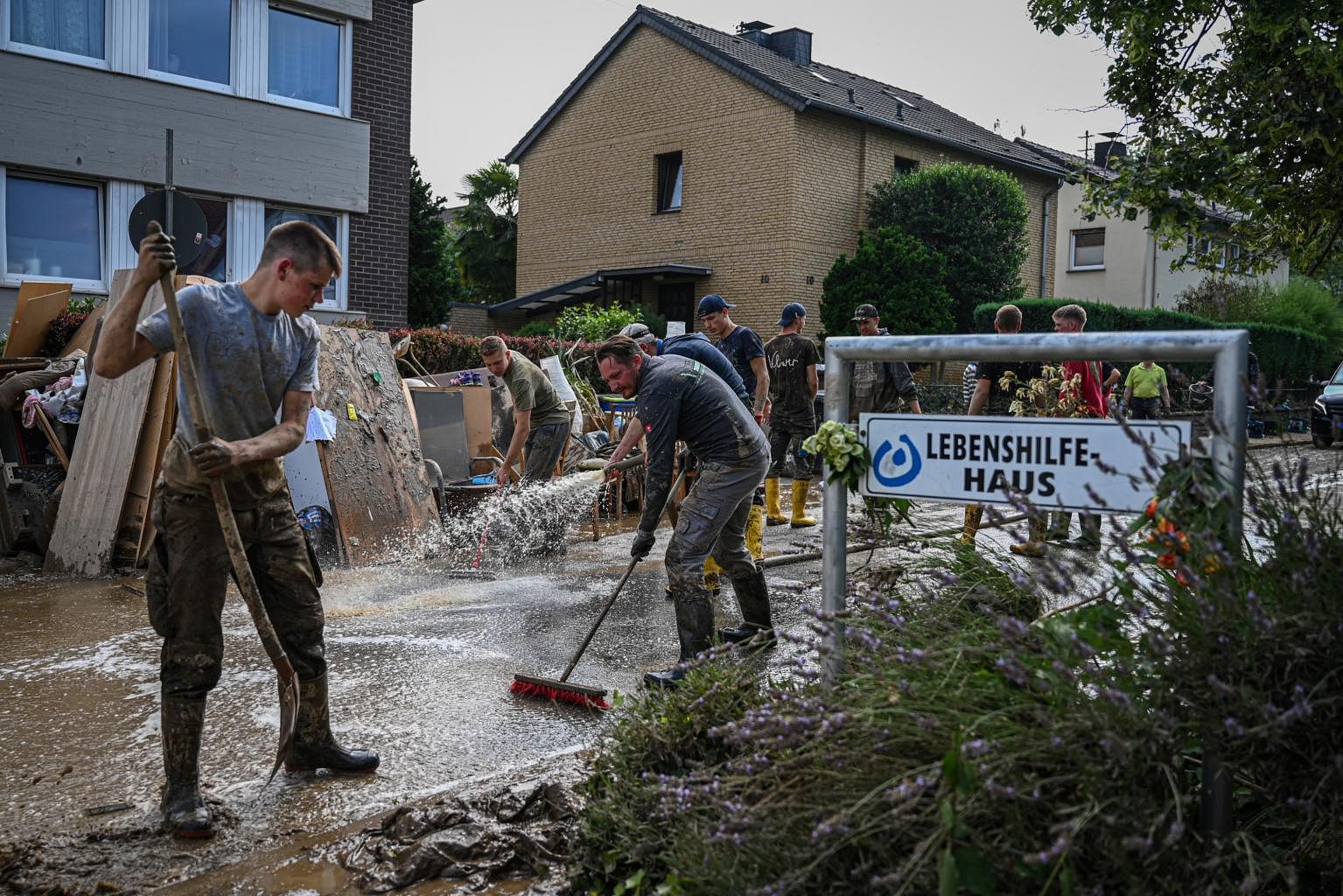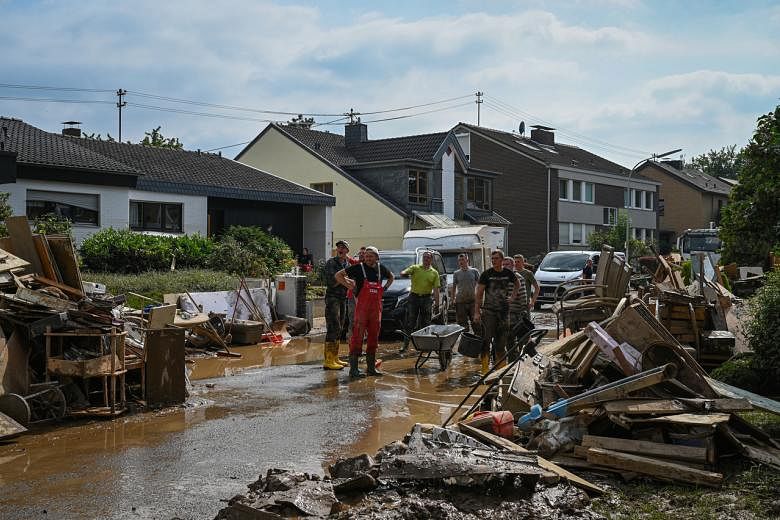SINZIG, GERMANY (NYTIMES) - If the calamitous floods that have hit Germany have an emotional centre, it is in Sinzig, a small town between the Rhine and Ahr rivers.
Across Germany over 150 people are dead, with hundreds more missing. But the 12 dead in Sinzig have broken hearts all over the country and demonstrated most vividly the tragedies that could have been avoided had flood warnings been better heeded.
They were disabled residents of a care home, the Lebenshilfe Haus, along residential Pestalozzi Street. They were asleep, in the care of a single night watchman, as the waters of the flash flood suddenly rose very early on Thursday (July 15), and they were trapped on the first floor of the home and drowned.
Neighbours could hear screaming, they said later, but all the emergency workers could do was to save the other 24 residents on higher floors some three hours later, bringing them out the windows in small boats.
"Every person who dies is a tragedy,'' said Ms Tabera Irrle, 23, a train driver who came to Sinzig to help with the cleanup after the floods. "But this is a special sadness,'' she said, brushing her eyes with muddy hands.
Just beyond her, residents were helping firefighters roll over a ruined red Volkswagen that was blocking the street, while others held barbecue grills over the drains so that when they dumped out floodwater, larger objects would not fall into the city's sewage system.
Dominik Gasper, 17, was helping his parents and uncle clean out the mud and ruined belongings of his grandparents' house on Dreifaltigkeitsweg, a street near the care home. He knew about the 12 dead, he said.
"It was so horrible,'' he said. "You can't really understand such a thing.''
His grandparents, Klaus and Anna Rams, are fine.
"They were so lucky," he said. "No one was hurt, but their basement was full of water."
The Rams looked haggard and exhausted, both covered with mud, and waved away questions.
The waters crested in Sinzig at more than 7m, the highest in a century, said Mr Andreas Geron, the mayor. He said fire trucks tried to warn residents late on Wednesday, but few said they had heard any warning.
Two other Sinzig residents died in this town of 20,000, and a newly renovated bridge over the Ahr collapsed.
Mr Luis Rufino, 50, is a lifelong resident of Sinzig and works for Environmental Service GMBH, which serves the varied municipalities in the area. He was taking a break from helping the cleanup and was angry about what happened at the Lebenshilfe Haus.
"Our health system is better than in the US, but they are still trying to avoid costs,'' he said bitterly. "So there was only one guy watching over these poor people, and when the lights went out they went into a panic, and when the flood came through they had no chance.''

By 3.30am, he said, "There were efforts to evacuate people and dead bodies were floating there."
He looked away, and said: "I'm not here to judge but this system of crisis management didn't work well. When the water started to come hard where the Ahr starts they just had to say - 'Look, a big flood is coming' - and some percentage of all this could have been avoided.''
Mr Ulrich van Bebber, the chair of Lebenshilfe, which has operated the care home since it was built 27 years ago as the first residential home for the disabled in the region, told journalists afterwards that "we are all horrified, stunned and infinitely sad". He said those who survived were being cared for.
"We want to keep the Lebenshilfe Haus as a residential facility and, if necessary, rebuild it," Mr van Bebber said.
At a nearby shopping centre, Kaufland, Ms Mina Sabatschus, 19, was still shaken by what had happened.
"I was so shocked and very sad, and I wanted to help, but it's so sad,'' she said. "I feel so sad, I don't even want to think about it.''

Ms Sabatschus paused and then said: "People know their family is dying and they can't do anything." She paused again. In the face of such tragedy, she said, a touch plaintively, "I decided the best was to help my friends.''
Some of those friends, in Heimersheim and Bad Neuenahr, just a few miles to the west along the Ahr River, lost everything, Sabatschus said - homes, cars, furniture.
"But at least they are alive,'' she said.
With bridges down, she could not get there to help them, but she will, she vowed.
She has finished school and is working for a time in a supermarket, she said, to earn money before going to university, where she wants to study English and philosophy and then teach.
Ms Sabatschus is angry with local and federal officials.
"The government should have done more - they knew this hard rain was coming,'' she said. "There was no real warning - they said nothing."
Her friends woke up at 2am to suddenly find water already at 0.6m and rising, she said.
"They didn't know - but the officials did know," Ms Sabatschus said.
Her friends told her they were particularly disgusted when some politicians came to visit the area dressed in suits, not talking to residents in Bad Neuenahr, "just so they could say they were there on the television news.''
She took the arm of her partner, Mr Toni Werner, 20, a computer programmer in an engineering company.
"At least I was with him,'' Ms Sabatschus said, finally smiling. "So I didn't have to worry about what had happened to him.''

